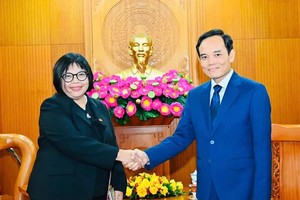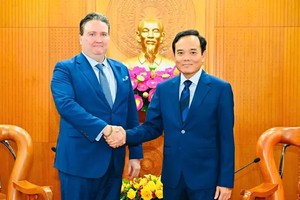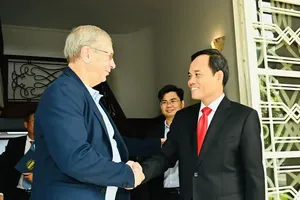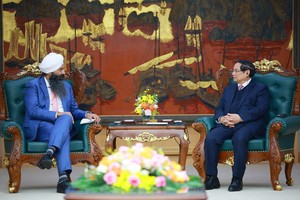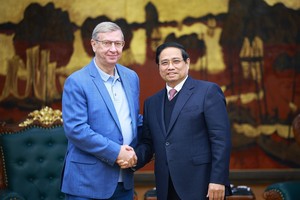Emotional US lawmakers squared off at a drama-filled hearing on the homegrown Muslim terror threat, showcasing sharp discord over the extent of radicalization and how Islam fits into the American tapestry.
The first Muslim member of Congress broke down and cried as he addressed the House Homeland Security Committee, where lawmakers clashed angrily over the tenor and purpose of the hearing -- and whether the proceedings were pointing a finger at America's true enemy or fueling suspicion and playing into the hands of Al-Qaeda by singling out Muslims.
The Republican who called the hearing, Representative Peter King, promised a thorough investigation into the radicalization of Muslim Americans and notably whether leaders in their communities are doing enough to stop violent extremism.
Testimony reached an early emotional peak when Democrat Keith Ellison, the first Muslim elected to Congress, broke into tears as he warned against "scapegoating" and told the story of a Muslim-American paramedic who died trying to save victims of the World Trade Center attacks on September 11, 2001.
"His life should not be identified as just a member of an ethnic group or just a member of a religion, but as an American who gave everything for his fellow Americans," said Ellison.
The panel also heard from a Tennessee father whose son converted to Islam, was radicalized and then killed a US Army private, and from the uncle of a Somali-American teenager who was inspired to embrace extremism and travel to Somalia, where he was killed.
Abdirizak Bihi said that when he confronted the Muslim leaders in Minnesota about radicalization of his nephew, they "threatened me and intimidated me."
Critics argued the hearing's singular focus was an ugly revival of McCarthyism, but King and others insisted it marked a victory over "political correctness" that blinded Americans, including in many Muslim communities, to the very real dangers of radicalization.
"This committee can not live in denial," King said. "Only Al-Qaeda and its Islamist affiliates in this country are part of an international threat to our nation."
Afterwards King described the hearing as a success and said similar ones would follow in 2011. He also dismissed what he called the "paroxysms of rage and hysteria" from special interest groups in the build up to the session.
"The purpose of today's hearing was to inform, not to inflame," added Representative Dan Lungren.
But the hearings very clearly renewed contentious debate over violent extremism in the United States nearly 10 years after 9/11.
King has said Muslim leaders and mosque imams are doing too little to stop the radicalization of young Americans and are not cooperating with law enforcement.
The unusually spirited debate -- King had to bang his chairman's gavel several times to restore order among arguing lawmakers -- was a stark illustration of the divide over exactly how to address one of the most contentious and sensitive US security issues.
Democrats on the committee launched fierce assaults on King's probe, with congresswoman Sheila Jackson Lee loudly branding the proceedings an "outrage" and that singling out Muslims was the perfect recruiting tool for terror groups.
"This hearing today is playing into Al-Qaeda right now around the world," she charged.
Jackson Lee held out a copy of the US Constitution and boomed: "This breathing document is in pain."
Los Angeles County Sheriff Leroy Baca, the only lawman to testify, said police engagement with the Muslim community was vital to law enforcement but stressed that a study of radicalization ought to be expanded to "all groups, regardless of religion."
"It is counterproductive to building trust when individuals or groups claim that Islam supports terrorism." he said. "This plays directly into the terrorist's propaganda that the West's 'war on terror' is actually a 'war against Islam.'"
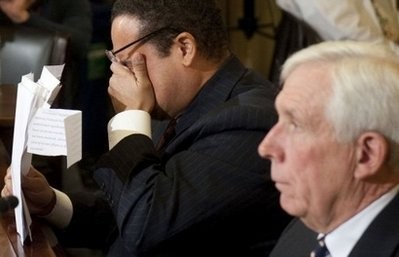
But the Muslim-Americans who testified said the hearings were crucial -- and that the Muslim community and US authorities needed to step up to tackle the issue.
"We're failing" in efforts to confront the threat, said Zuhdi Jasser, founder of the American Islamic Forum for Democracy.
"I'm Muslim, I realize it's my problem... and the problem is increasing exponentially."
Melvin Bledsoe, whose son killed a soldier at a US Army recruiting station in 2009, told how Muslim extremists in the United States and then in Yemen "programmed and trained my son Carlos to kill."
He said not enough was being done to address radicalization.
"It came to my home, but it's at your doorstep, and we need to talk about it as an American people," Bledsoe told reporters.

